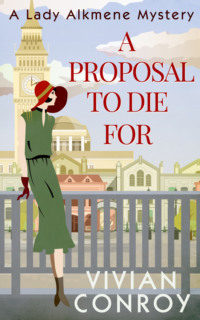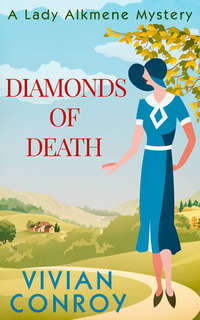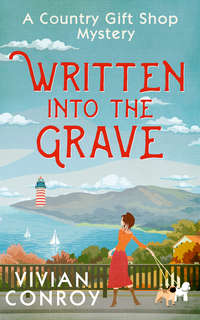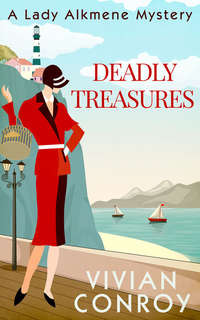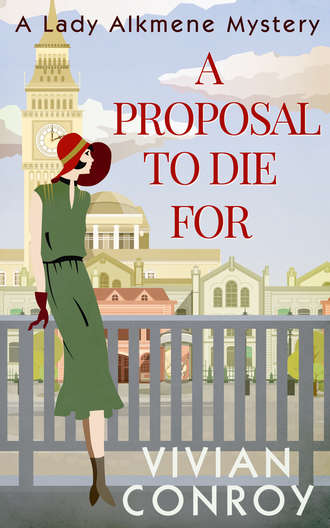
Полная версия
A Proposal to Die For
Alkmene hitched a brow at Mr Dubois.
He shrugged, looking at the countess. ‘I told you, madame, that I am still gathering evidence and that I am not yet in a position to lay blame at anybody’s door.’
Alkmene narrowed her eyes at the choice of words. ‘Are you with the police?’
Dubois tilted his head back and laughed. ‘Fortunately not. In some cases they are my worst enemies.’
‘Cases?’ Alkmene picked up her teacup. ‘So you do investigate matters. More like a consulting detective?’
Perhaps she could engage him to gather some information for her on the man returned from the dead? She had no idea how else one engaged a detective, except by advertising for one, but if her father ever found out about that, he’d burst a vessel.
The countess’s Russian companion seemed to have perked up at the word police. Although she was still knitting like her life depended on it, her face was scrunched up in a typical listening expression.
But the countess had emphasized time and time again to Alkmene and anybody else who wanted to hear that the woman only spoke Russian and didn’t understand anything of whatever was said around her. Where the countess took the greatest care never to gossip when a servant was around, she considered the presence of this supposedly ignorant woman perfectly safe.
‘Mr Dubois,’ the countess said in the excited tone of a debutante on the eve of her first ball, ‘is a journalist. He has written for papers in Paris.’
Paris was by far the countess’s favourite city, where she had also spent her honeymoon. Whenever she mentioned it, her eyes lit up, and her whole face flushed with happy memories. Alkmene had to admit Paris was probably one of her own dream destinations for a little trip, but saying that right now might look like she was inviting herself.
She gave the man another glance. ‘You are French?’
‘Half.’
‘Father French, mother English?’ Alkmene conjectured based on his foreign last name. ‘Did they meet on the Riviera? I have heard it is quite the must-see.’
In fact, when one happened to be in Paris and had a fast car at one’s disposal, one could easily pop down to the Riviera for a spell, Freddie had told her. If he hadn’t wasted his entire inheritance at the card table, he might have taken her some time.
Perhaps she should be grateful for the card debacle, as Freddie might have gotten it into his head to propose to her, and the whole trip would have been spoiled by her rejection.
Not that Freddie was in love with her or anything. They had always just been friends, meeting at the races or the theatre, sharing a laugh and a joke, and forming the ideal object of a lot of gossip about the possibilities if they ever became engaged. It was no secret Freddie was desperate to land a rich heiress, and venomous tongues agreed that Alkmene, at her age and with her temper, should be happy any man wanted her at all.
Alkmene just hoped that Freddie would be smarter than to ever propose to her, on the Riviera or wherever, as he was such a sore loser that after her resounding NO! he’d no doubt be sulking for three months.
Mr Dubois didn’t seem enticed by the Riviera either. He looked out of the window, even shifting position in his chair to catch a better view of something out there.
Alkmene would have thought it rather rude, had not something in his expression convinced her there was something really worthwhile to see.
The countess also tried to catch a glimpse of the object of his interest. ‘Ah. It is her.’ She focused on Alkmene, adding, ‘The woman who caused such a commotion at the theatre. You saw her at the party, busy with that…’ she looked for the appropriate word ‘…screen?’
Alkmene nodded. ‘Isn’t she called Evelyn Steinbeck?’
Dubois glanced at her. ‘The American actress, yes. You know her?’
Alkmene shrugged. ‘Casually. What is she doing here this morning? Art perhaps?’
Dubois glanced at her again, sharper this time. ‘What has she told you about the art?’
Alkmene didn’t think it prudent to admit Evelyn hadn’t told her a thing, about any subject. Apparently her knowledge of Evelyn Steinbeck made her interesting to Dubois, and on her part she wanted to know what he knew about the actress and her dead uncle. She said casually, ‘Just that it is one of the best collections in the country. Rembrandt, Van Gogh, Rodin.’
She was just repeating what she had read in the paper an hour ago, but Dubois nodded seriously. ‘I wanted to interview him about his collection. He managed to get his hands on some very wanted pieces. It was hard getting through to him though. Lived like a hermit, hardly showing his face anywhere. And when he did appear, he shied away from strangers like they were rabid dogs.’
‘Strangers, or just reporters?’ Alkmene asked, holding Dubois’s gaze. ‘The press doesn’t always have a good name.’
‘I don’t see what harm there is in a nice piece about someone’s art collection,’ Dubois countered with a tight expression.
The countess interrupted, saying in a thoughtful tone, ‘It looks like she is taking up residence there. So many suitcases.’
Quickly Alkmene slipped into an empty seat to catch a view of the street. On the other side the Hotel Metropolitan’s uniformed porters carried a dozen suitcases through the open double doors. A familiar statuesque figure with blonde hair catching the sunshine stood watching everything with a critical intensity. Evelyn Steinbeck, fleeing the murder scene…
The countess said, ‘I have heard the Metropolitan’s mattresses are quite good, but their bread is bad. All English bread is, by the way. You cannot bake bread like the Russians can.’
‘But does it relate to the murder?’ Alkmene wondered out loud as she scooted back into her old place.
At the word murder the countess’s companion knocked over her teacup.
Chapter Three
Although almost empty, a stream of brown liquid flowed over the table’s crisp white damask cover.
The woman raised her hands and whimpered in what could be Russian curses or supplications to the saints from the gold-rimmed icons.
Dubois pulled out his handkerchief and pushed it on the wet spot.
The countess clicked her tongue and said, ‘You shouldn’t be so clumsy, Oksana Matejevna. The whole room is looking at you.’
The woman continued to make high-pitched sounds of regret and frustration while tugging the handkerchief from Dubois’s hand and dabbing herself.
That hand, with a small scar on the thumb and the deep tan matching his face, didn’t seem that of someone chained to a typewriter in an office, but of an adventurous sailor who had travelled the seven seas.
A bit of jealousy stabbed Alkmene as she imagined Dubois undercover for some story in an exciting foreign city like Venice, hiding in a dark alley and watching the front of an antique palazzo where stolen art would be delivered after nightfall. She bet Dubois had an interest in the dead man’s art collection because he was investigating some big case. Perhaps theft of art from some museum by thieves who worked for a private collector? Not everybody got the objects of their desire by honest means.
Ah. Men got to do all the fun things while women were supposed to stay at home because their lungs were weak, or something.
‘Murder, you said?’ Dubois asked with a probing look at her. ‘I thought the untimely death of Evelyn Steinbeck’s uncle was an accident.’
‘That is what the paper said. A fall on the rim of the hearth. But as nobody was home at the time it happened, we can’t be sure he really fell, can we?’
Dubois held her gaze. ‘Meaning?’
Alkmene hitched a brow. ‘Isn’t it a coincidence he slips and falls and dies on the very night when all the servants have their night off? I don’t suppose it is hard to figure out what night that is, if you just keep an eye on the household for a while.’
She added almost as an afterthought, ‘Or know the routine from the inside, to begin with.’
Dubois leaned back in his chair. ‘You are suspecting a member of the household of involvement?’
Alkmene wasn’t about to make wild accusations. Stories could go and live a life of their own and an innocent person could get in trouble. Sipping her tea, she took a moment to compose her thoughts, then said with a nod at the window, ‘Now that Mr Norwhich is dead and you can’t interview him any more, I suppose you are interested in writing up Ms Steinbeck’s life story? It has to be tragic. I bet her parents died when she was young, she had to fend for herself and now that she has found some fame on the stage and wants to find family, her uncle, her only living relative, has died too. Maybe the newspapers can even turn it into some curse story that the masses will gobble up?’
She gestured in the air in front of her, like unrolling a banner text. ‘Family curse strikes again.’
The Russian companion dropped the damp handkerchief and slumped in her seat, saying something to the countess in an angry tone.
The countess said something in return, first soothing, then scolding.
She smiled apologetically at Alkmene. ‘Russian country people are terribly superstitious, dushka. They believe that the mere mention of death brings bad luck. She doesn’t want to sit with us while we discuss murder.’
Oksana Matejevna pushed her knitting into a large embroidered bag and stood, her chin up, her eyes staring into the distance.
The countess gave her a short instruction, and the woman padded off.
‘I have sent her ahead to the dressmaker’s,’ the countess explained. ‘She is far too nervous to endure this.’
Alkmene smiled at her, then returned her attention to Dubois. ‘You were saying…’
‘No, you were saying something. Something interesting. The house was empty that night, and the killer, if there was one, might have known that.’
Alkmene nodded. ‘The newspaper article was very low on facts. I’d like to know for instance whether the library door was locked on the inside or not when the manservant tried to enter in the morning. If any visitors called that night, if there were traces of a struggle in the room…’
Dubois nodded appreciatively, but his voice was level when he said, ‘I assume the police have full details, but are not eager to divulge those to the public.’
‘And there is no way to find out what they know?’
His silence said it all. He had such ways. He did know things about the circumstances surrounding the death.
Already!
Again she was jealous of him because he had sources, access to people who would tell him things they’d never tell to her. She was a woman, a lady at that. She was supposed to worry about ostrich feathers, not about murder.
Or stolen art?
Dubois was looking out of the window again, probably at the hotel’s front. She could hardly change seats again to see what distracted him now, so she remained on her chair, upright. She put her next question in a somewhat demanding tone, to pull his attention back to her. ‘You have access to police information?’
He kept staring into the street. ‘I do, but I don’t need them. Street informers are much more reliable.’
‘Doesn’t it sound exciting?’ the countess gushed. Her cheeks reddened, an obvious sign she wasn’t in the least bothered by any superstition about death. Indeed, she scooted to the edge of her seat and sat with her hands on the table, watching Dubois with her sharp little eyes like a robin’s. ‘Tell me, have you ever been in danger, for your life?’
‘It is not a game,’ Dubois said. He was not looking at the countess, but at Alkmene, almost as if he was trying to warn her.
She pretended not to notice and took a large bite of her pie that had mainly gone unnoticed so far.
Dubois said, ‘I hope the coroner can figure out how a healthy man takes a tumble in his own library and is suddenly dead.’
‘Well, some people do seem to suffer from egg-shell skull,’ Alkmene said round another large bite of chocolate cake with whipped cream and kirsch filling. ‘They are born with a skull that is thin and breakable, but nobody knows it until some fatal day when they either fall or are hit by something… There are several recorded cases of it where just a slight contact could lead to severe damage and even death.’
Dubois hitched a brow at her. ‘How would you have access to such recorded cases? Is your father or brother perhaps involved with the courts?’
She would have to have heard via a male contact of course. Like women couldn’t figure out anything on their own!
The countess tittered. ‘Oh, no, Alkmene is a real lady. She has not stolen her English title like me, by marriage, but has inherited it from a straight line going all the way back to the days of William the Conqueror. Her father can tell you all about it.’
Dubois’s jaw set. He emptied his cup in a single draught and stood. ‘You ladies must excuse me. I have other things to do. Good day.’ And he slammed his hat on his head and walked off.
The countess waited until he had left the tea room, then shot up straight. ‘Oh, dear me, now I have forgotten to return this.’ She pointed at Dubois’s damp handkerchief left on the table where it had soaked up Oksana Matejevna’s spilled tea. ‘Be a dear and run after him to give it back. You are young and can do it, not me.’
Alkmene would normally have declined any errand that involved running after haughty newspapermen, but Dubois seemed to know more about the death of Silas Norwhich, the art collection, and the wily niece, now sole heir. That might be worth looking into.
So for the sake of the case only, she put on her gloves, picked up the handkerchief and left the countess to finish her tea and pie alone. Also to pay the bill, coincidentally. Her father had left money with the household staff to make sure she was provided for in his absence, giving her only a small allowance to get by. That could better be spent on information than on chocolate cake.
Outside Alkmene looked down the street in one direction, not seeing Dubois’s tall straight back anywhere. She turned her head and sought him in the other direction. Nothing either. He could not have gone far…
Had he hailed a cab and dived into it so quickly she had missed him?
Suddenly her eyes focused on the hotel on the other side of the street. Of course.
He had said he had other things to do…
She bet they involved an attractive American heiress who had been very quick to leave the house where her uncle had died a tragic death.
At her hands? Dubois had asked if she suspected someone in the household of involvement in a tone that suggested he could hardly believe it. But she bet he had not missed the fact that Evelyn Steinbeck would inherit her uncle’s entire fortune. Including his coveted art collection.
Alkmene crossed the street, avoiding a heavy laden brewery wagon, and smiled at the hotel porters as if she came here every day. She wished she had put on her better clothes anyway, because first-rate hotels could be picky about admitting just anybody and she had no wish to be asked, however discreetly, to leave.
Inside she breathed in the scent of the thick carpets, well-waxed oak furniture and fresh flowers that had just been put on the tables in the lobby. A chambermaid in a crisp black and white ensemble was rearranging a stem here and there, lingering as if she didn’t want to return to the heavier duties upstairs: cleaning rooms and making beds.
The hushed silence as of a giant old library forced Alkmene to progress with slow steps, avoiding any harsh ticking of her hard-soled shoes. Dubois had probably taken the elevator upstairs to search for the heiress’s suite.
Then a hand arrested her arm, and she was whooshed behind a palm. Gasping in indignation, she stared up into the hard features and dark eyes of Dubois. ‘What are you doing here?’ he hissed.
Wordlessly Alkmene held up his stained handkerchief. He wanted to take it from her, but she pulled back. ‘Tea stains can be tricky. I suppose you have no one to launder for you?’
He huffed. ‘My landlady, but she has already ruined one of my best shirts with her starch.’
‘Then let me launder it for you and return it to you later this week.’ She wanted to know where he lived so she could get in touch with him later. He was the closest thing to a detective she had right now and she was not about to let him walk away.
He gave her a patronizing little smile. ‘I bet you do not launder. I bet you do not even know how to launder. Or how to cook.’
‘You’d be surprised,’ Alkmene retorted, although painfully aware she had no idea how her stained skirts from gardening or her blouse with inkblots got clean again. Cook’s niece did the laundering, a nice woman with freckles and too many children crammed into a little house on a back alley. If the stains were particularly difficult, Alkmene made sure to give some extra money to Cook to pass on and she had always felt that was about as much as she needed to know about the process.
Now this man made it sound like a crime that she didn’t know how to get this handkerchief cleaned up herself.
Probably a communist dead set against English aristocracy.
Believed everybody should live on the kolkhoz and share all the work and income equally.
But cleaning his handkerchief had to be simple enough, and she would prove it to him.
‘You will get it back, cleaned by my own hands,’ she promised.
The corners of his mouth jerked up as if he was about to smile for real, but then he increased the pressure on her arm and pulled her further back.
‘What the…’ Alkmene spluttered and then fell silent with pure surprise.
There in the lobby of the grand Metropolitan hotel was Oksana Matejevna, speaking to a bellboy who looked about him furtively as he breathed answers.
‘Either that bellboy happens to be fluent in Russian,’ Dubois said in a low voice beside her, ‘or our dear superstitious country lady speaks better English than she pretends to do.’
‘I could have sworn she was soaking up every word we said,’ Alkmene responded in a half grim tone. ‘What on earth is she doing here, asking questions?’
‘I suppose she is after the same person we all are,’ Dubois said pensively.
Alkmene stared in fascination as the mousy Russian woman fished a coin from her purse – probably her employer’s money too! – and handed it to the bellboy who accepted it with another guilty glance around him. Then, satisfied it had been unobserved, he stepped away from her and resumed his duties.
Oksana Matejevna walked to the exit, her head held high, and disappeared into the brisk morning.
Alkmene snapped to it and focused on Dubois. ‘The same… You mean, Evelyn Steinbeck? The dead man’s heiress?’
Dubois nodded. ‘Oksana had a chance like all of us to see her go in here. She must have made up that excuse of being so scared about talk of death and murder to be able to leave ahead of the countess and come in here to bribe that bellboy into giving her information.’
Alkmene chewed her lower lip. ‘Or the countess instructed her to do it. I do not understand Russian so I am not sure what she said to her exactly before she left. You?’
Dubois stood staring at the floorboards, deep in thought. She touched his arm. ‘Are you sure the countess sent her to the dressmaker’s?’
Dubois shook his head. ‘But if she had instructed her to go here, she would have said something like American actress, or Steinbeck, or hotel, other side of the street. I know enough Russian to have caught her out, I’m sure.’
Alkmene sucked in a breath. ‘So Oksana Matejevna came here of her own accord. Apparently wanting to know more about Evelyn Steinbeck. That makes no sense. If Ms Steinbeck is indeed an American actress, what on earth can a Russian maid want to do with her?’
Dubois shrugged. ‘Communists are everywhere. Maybe Ms Steinbeck came here to get in touch with fellow comrades.’
‘And when her uncle found out about her uh…political disposition and disapproved of it, she pushed him, so he fell on the hearth rim and died?’ Alkmene shook her head. ‘That sounds a bit far-fetched to me. I’d like to know who the man is who returned from the dead.’
‘Who?’ Dubois’s eyes sparked with interest.
Alkmene knew she could only bait him if she dangled the information just out of his reach. ‘I overheard some interesting tidbits at a party I attended earlier this week. That is why I just knew when I read about Mr Norwhich’s death in the paper that it was not an accident. He must have been pushed. Maybe the intention wasn’t to kill him, but just to make a point? Or it happened in an argument, a flare of temper.’
Dubois held her gaze, waiting for her to go on and explain herself.
Alkmene said cautiously, ‘I suppose you also have your reasons for looking closer?’
Dubois shrugged. ‘I wanted to interview him about his art. He was suspicious of anyone approaching him. At the time I merely thought he was eccentric. But now that he is dead, I wonder if he was afraid.’
Alkmene nodded. ‘He must have been.’
Dubois said softly, ‘But if he was afraid, why did he open the door to his killer?’
Alkmene stared at him. ‘You are certain he let the killer in? So he wasn’t all alone in the house that night.’
Dubois shrugged again. ‘The police can question the same people I talked to. I suppose they will then hear the same things.’
‘You questioned people? Who? People in the street perhaps, neighbours or some peddler who was around?’
Dubois grinned. ‘Getting warmer.’
Alkmene tilted her head. ‘Someone saw a man coming to that house on the night of the death. Tall, broad in the shoulders.’
Dubois stood very still. ‘How do you know his physique?’
She shrugged. ‘Because it fits with what I heard at the party. An incident that happened just a few days before Silas Norwhich died. It must be related.’ She waited a few moments to sustain the suspense. ‘I can tell you of course, but then I want in on everything you already know.’
She was certain Dubois would jump at this chance, but he laughed softly. ‘That hardly seems like a fair exchange. What can a bit of high society gossip give me?’
‘Not gossip. Facts. But if you feel that way, fine.’ She stepped away from him. Why try to work with somebody who had a head full of prejudice about her class and probably also her sex?
She added, ‘You had other things to do, you said? Good day then, Mr Dubois.’ She turned on her heel.
His demanding voice halted her. ‘When will I get my handkerchief back?’
Alkmene stood, not looking back at him. Upon returning his handkerchief, she might get another chance to convince him that what she knew was valuable. That he had to share what he knew and they might put two and two together. She wouldn’t give up so easily on this chance to investigate a real-life case of suspicious circumstances around a violent death. ‘Where can I reach you?’
‘I have hired rooms on Meade Street. In case you do not know it…’
Before he could infer she didn’t know a street on the East End, Alkmene held up a hand. ‘Isn’t that where that undertaker used his coffins to smuggle two escaped prisoners right through a police barricade?’
Dubois grinned at her. ‘A sergeant who had been giving me some trouble about a piece I wrote got suspended because of it.’
Alkmene tilted her head. ‘Of course you wouldn’t have known one thing about it.’
‘Only after the fact. Had I known before, that would have made me an accomplice.’
Alkmene laughed. ‘Somehow, Mr Dubois, I don’t think you would mind.’
She walked to the exit, calling over her shoulder, ‘I will be in touch when I’m done with those tea stains.’
Chapter Four
‘By George,’ Alkmene exclaimed.
Sweat beaded on her forehead from the heat rising from the hot water in front of her.
It was Cook’s day off, so Alkmene had her realm – the kitchen and pantry – all to herself. She had come in humming, assured that she’d have this little thing settled in no time. Green soap cleaned anything, after all.


